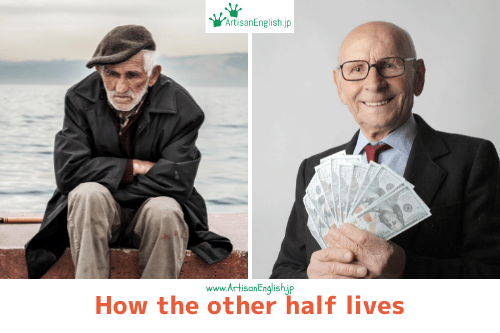
YouTube / iTunes / Spotify / Radio Public / Pocket Casts / Google Podcasts / Breaker / Overcast
Listen to ArtisanEnglish.jp posts & lesson intros here.
Phrase: How the other half lives
What would you do if you won a tremendous amount of money?
I ask this question in all seriousness; please give it some thought.
Would you pay off all your outstanding bills, move to an upscale neighbourhood, start eating at expensive restaurants with at least two Michelin stars, make a few new rich friends and see how the other half lives?
If you are rich, the other half is poor, and if you are poor, the other half is rich. To see how the other half lives, you should become them.
Or would you drop the money in your bank account, get up early the following day, eat breakfast, and walk out the door to take your place in the rat race?
A couple of years ago, I created a lesson about winning the lottery.
The people who want to experience how the other half lives quickly go bankrupt.
You see, the rich or the other half, as some people like to call them, are different from us regular folk.
I’ve created a conversation lesson on that as well, by the way, called Eat the Rich.
You see, the average Joe wants to see how the other half lives.
That’s why people take bus tours to drive past the luxury mansions in Beverly Hills.
We cannot, however, live like the other half, especially if wealth comes to us quickly.
It’s like a teetotaler suddenly chugging down six bottles of Lion Stout from Sri Lanka.
It’ll go right to their head.
Well, sudden wealth goes right to ours.
We want to see how the other half lives, but we can’t be the other half.
Money is something you have to either grow up with or acquire through hard work, determination and dedication.
On the other side, the grass is greener, but it’ll kill you if you overeat too quickly.
To truly understand how the other half lives, you must become the other half – slowly.
Flesch-Kincaid Readability Test
This post is understandable by someone with at least a 7th-grade education (age 12).
On the Flesch-Kincaid reading-ease test, this post scores 76.
The easier a passage is to read, the higher the score on a scale of 0 – 100.

